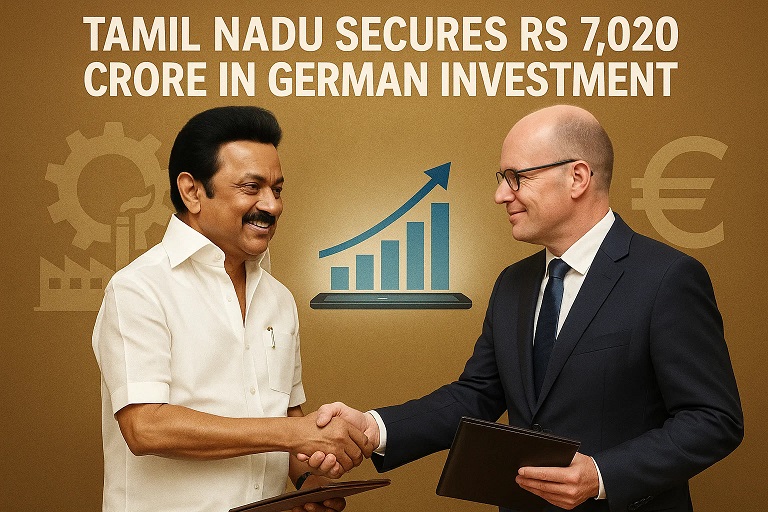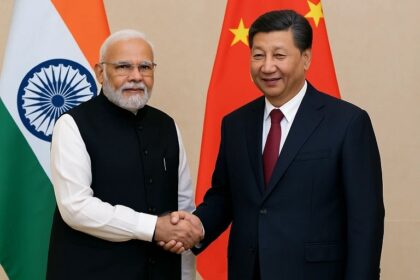Tamil Nadu Secures Rs 7,020 Crore in German Investments: A Strategic Leap Toward Industrial Dominance
Tamil Nadu has cemented its place as a leading global investment hub with a remarkable achievement: securing 26 Memoranda of Understanding (MoUs) worth Rs 7,020 crore during Chief Minister M.K. Stalin’s week-long visit to Germany, which concluded on September 2, 2025. These agreements, signed with top German companies at the TNRising Germany Investment Conclave, are expected to generate over 15,320 jobs across various sectors. This milestone reinforces Tamil Nadu’s ambition to achieve a $1 trillion economy by 2030. The investments reflect the state’s strong industrial base, skilled workforce, and investor-friendly policies, positioning it as India’s industrial powerhouse, much like Germany’s leadership in Europe. This article delves into the factors driving this surge in investments, the historical context, and the transformative impacts on Tamil Nadu’s economy and global standing.
Why This Investment Surge Matters
The Rs 7,020 crore influx from German firms underscores Tamil Nadu’s growing appeal as a hub for advanced manufacturing, renewable energy, and technology. With over 60 German companies already operating in the state—including industry giants like BMW, Siemens, and Bosch—these new commitments signal strong confidence in its infrastructure and governance. For global business leaders, this development opens doors for partnerships in high-growth sectors. For policymakers, it represents a step toward economic resilience, especially in light of global trade challenges, such as the potential impact of US tariffs, which could cost Tamil Nadu $3.93 billion in exports by FY26.
Economic Events Leading to the Investment Surge
The centerpiece of Chief Minister Stalin’s visit was the TNRising Germany Investment Conclave, held in Düsseldorf, where 23 MoUs worth Rs 3,819 crore were signed, promising to create 9,070 jobs. Combined with three earlier agreements worth Rs 3,201 crore, the total investment reached Rs 7,020 crore. Key players like Knorr-Bremse, Nordex Group, and ebm-papst led the charge, with additional commitments from companies like Vensys Energy and BASF. During his visit, Stalin also engaged with BMW executives to discuss expanding their Chennai plant for electric vehicle production, further highlighting Tamil Nadu’s burgeoning EV ecosystem.
Key Investment Highlights
- Knorr-Bremse: The Munich-based leader in braking systems committed Rs 2,000 crore for a state-of-the-art facility focused on railway doors and braking systems. This is their first major manufacturing venture in Tamil Nadu, expected to create 3,500 jobs.
- Nordex Group: The Hamburg-based wind turbine manufacturer pledged Rs 1,000 crore to expand operations in Tamil Nadu, generating 2,500 jobs and enhancing the state’s renewable energy sector.
- ebm-papst: This energy-efficient motor manufacturer announced a Rs 201 crore expansion of its Global Capability Centre (GCC) and manufacturing base, creating 250 high-skilled jobs over the next five years.
- Vensys Energy: A Rs 1,068 crore investment to establish a wind component facility, expected to generate 5,238 jobs and strengthen Tamil Nadu’s green energy profile.
- Other Key Commitments: BASF, Bella Premier Happy Hygiene, Herrenknecht India, and others pledged Rs 1,751 crore, creating over 2,750 jobs in areas like catalysts, sanitary products, and industrial equipment.
Context of the Visit
Stalin’s trip to Germany, part of a broader two-nation tour that also included the UK, built on the success of his 2024 US visit, which secured Rs 7,616 crore in investments. Addressing the Tamil diaspora in Cologne, he highlighted Tamil Nadu’s 9.69 percent GDP growth in 2024-25, the highest among Indian states. The conclave underscored Tamil Nadu’s status as India’s manufacturing and industrial powerhouse, home to the nation’s largest number of factories and industrial workers, making it an attractive destination for global investors.
Historical Context of Tamil Nadu’s Investment Journey
Tamil Nadu’s rise as an industrial powerhouse can be traced back to its early adoption of pro-business policies and infrastructure development. German companies have had a presence in the state since the 1990s, with BMW establishing its Chennai plant in 2007. In recent years, Tamil Nadu has further accelerated its foreign direct investment (FDI) efforts through strategic global outreach.
Key Milestones in Tamil Nadu’s Investment Journey
- 2019-2021: The Global Investors Meet (GIM) 2019 secured Rs 3 lakh crore in investment commitments, laying the foundation for Tamil Nadu’s trillion-dollar vision.
- 2022-2023: Strategic visits to the UAE, Singapore, and Japan yielded Rs 7,442 crore in MoUs, creating over 17,000 jobs.
- 2024: The GIM 2024 secured Rs 6.64 lakh crore in investments, including major deals like VinFast’s Rs 16,000 crore and Tata Motors’ Rs 9,000 crore, targeting 26 lakh jobs.
- 2025: The Germany visit added Rs 7,020 crore in new investments, reinforcing Tamil Nadu’s attractiveness amidst global supply chain shifts.
This trajectory reflects Tamil Nadu’s proactive approach, blending its Dravidian model of governance with economic growth, positioning itself as “India’s Germany.”
Future Prospects and Projections
The Rs 7,020 crore investment serves as a springboard for Tamil Nadu’s industrial goals. Projections suggest an annual 10 percent growth rate in FDI through 2030, with the state aiming to capture 30 percent of India’s clean energy production. By 2028, these investments could contribute Rs 20,000 crore to Tamil Nadu’s GDP and generate ancillary jobs in logistics and services.
Long-Term Strategic Outlook
Tamil Nadu’s long-term vision includes scaling up advanced manufacturing and green energy projects. Plans for a dedicated electric vehicle (EV) hub in Chennai and green energy corridors in Coimbatore are in the works. Collaborations with German companies could lead to technology transfers in areas such as AI-driven automation and sustainable materials, solidifying the state’s leadership in green industrialization.
Potential Challenges
However, challenges remain. Geopolitical risks, like US tariffs on textiles that could impact $1.62 billion in exports, are a concern. Additionally, sustaining power infrastructure to meet decarbonization targets will require Rs 2 lakh crore over the next seven years. Financial reforms may be needed to support power distribution companies, and competition from other states like Gujarat could divert some investments.
Impact on Tamil Nadu’s Economy and Stakeholders
These investments are set to reshape Tamil Nadu’s economic landscape. The creation of 15,320 jobs will boost local economies, while technology transfers will elevate the skill levels of the workforce. Tamil Nadu’s industrial dominance is expected to grow, aligning with its goal of becoming a $1 trillion economy.
Sector-Wise Impacts of German Investments
- Automotive and Electric Vehicles (EVs): BMW’s discussions about expanding its Chennai plant for EV production, coupled with strong infrastructure, could attract further investments. This sector could contribute Rs 10,000 crore annually to Tamil Nadu’s GDP, creating 5,000 jobs by 2028.
- Renewable Energy: Investments from Nordex Group and Vensys Energy will reinforce Tamil Nadu’s leadership in wind energy. This sector could reduce the state’s reliance on fossil fuels by 15 percent by 2030, contributing Rs 5,000 crore to the economy.
- Railway Components: Knorr-Bremse’s Rs 2,000 crore investment will position Tamil Nadu as a rail component hub, with an expected annual economic contribution of Rs 3,000 crore.
- HVAC and Industrial Equipment: ebm-papst’s Rs 201 crore expansion will foster innovation in energy-efficient technologies and create 250 specialized jobs.
- Chemical and Sanitary Products: BASF and Bella Premier Happy Hygiene’s investments will boost the state’s chemical and consumer goods sectors, contributing Rs 1,000 crore to Tamil Nadu’s economy.
Investment Breakdown by Key Players
| Company | Investment (Rs Crore) | Jobs Created | Sector Focus |
|---|---|---|---|
| Knorr-Bremse | 2,000 | 3,500 | Railway components |
| Nordex Group | 1,000 | 2,500 | Renewable energy (wind) |
| Vensys Energy | 1,068 | 5,238 | Wind components |
| ebm-papst | 201 | 250 | HVAC, automotive motors |
| BASF | 300 | 100 | Catalysts, battery materials |
| Bella Hygiene | 300 | 200 | Sanitary products |
| Herrenknecht India | 250 | 400 | Industrial equipment |
Frequently Asked Questions (FAQs)
What led to Tamil Nadu securing Rs 7,020 crore from Germany?
Tamil Nadu’s strong EV infrastructure, skilled workforce, and pro-business policies were key factors that attracted German companies like Knorr-Bremse and Nordex.Which sectors are benefiting from these investments?
The automotive, renewable energy, railway components, HVAC, and chemicals sectors are seeing significant benefits, with new jobs and technology transfers.What impact will these investments have on Tamil Nadu’s economy?
These investments will create 15,320 jobs, contribute Rs 20,000 crore to GDP by 2028, and integrate Tamil Nadu into global supply chains














